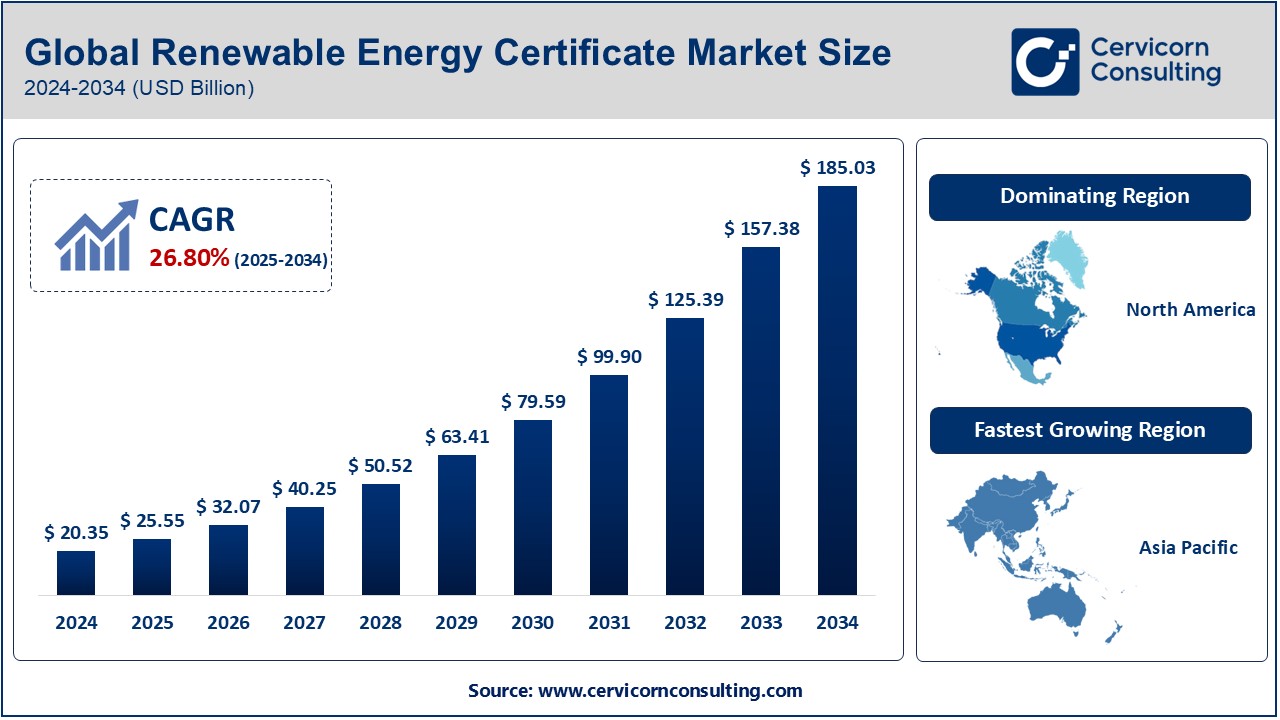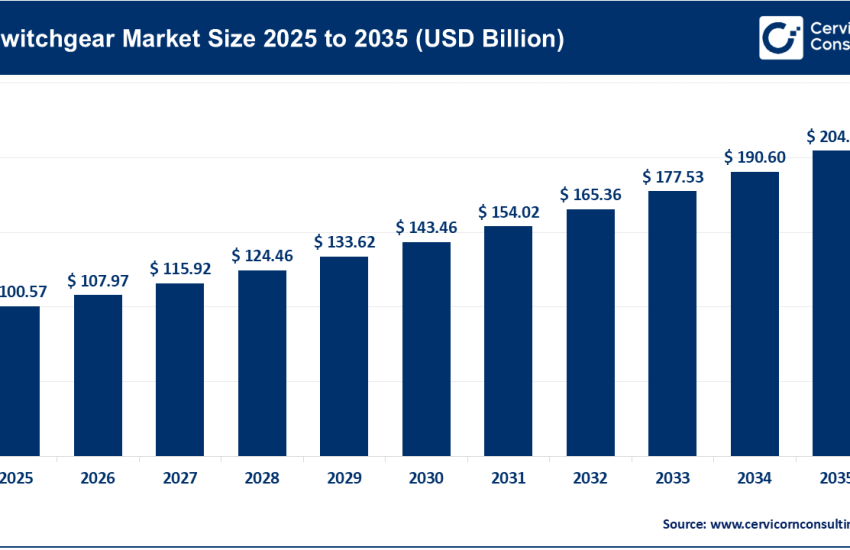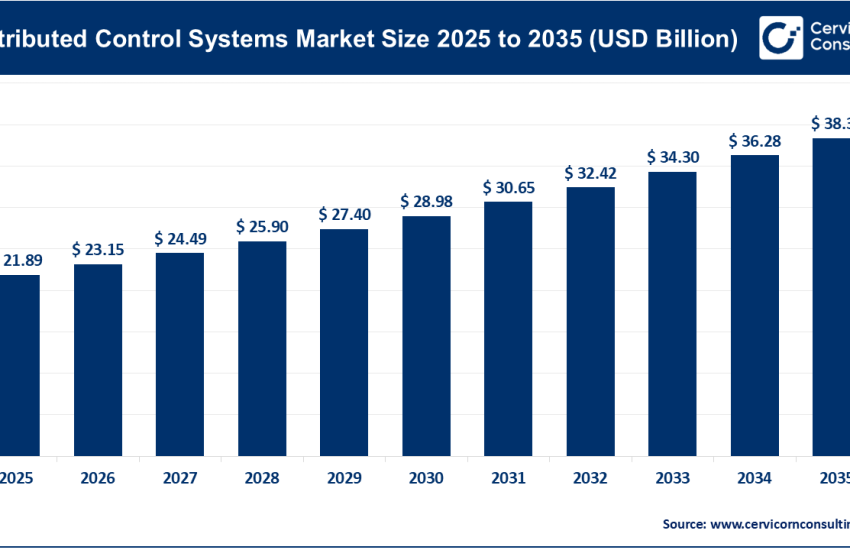Renewable Energy Certificate Market Trends, Growth, and Key Insights (2024-2034)
Renewable Energy Certificate Market Overview
The global renewable energy certificate market was worth USD 16.22 billion in 2024 and is anticipated to expand to around USD 185.03 billion by 2034, registering a compound annual growth rate (CAGR) of 26.80% from 2025 to 2034.
The renewable energy certificate (REC) market has seen tremendous growth, driven by factors such as increasing governmental regulations and renewable energy mandates, as well as rising corporate commitments to sustainability. The global push for net-zero emissions by 2050, coupled with technological advancements in renewable energy, has created a fertile environment for RECs to thrive. International agreements, such as the Paris Climate Agreement, have been instrumental in encouraging countries to adopt more aggressive renewable energy targets. As governments around the world continue to introduce incentives for clean energy production, the demand for RECs has grown significantly.
Additionally, the growing role of environmental, social, and governance (ESG) metrics in corporate decision-making has spurred private sector participation in the market. This combination of regulatory frameworks, sustainability goals, and consumer demand for greener alternatives is fueling the growth of the REC market.
What is the Renewable Energy Certificate Market?
The Renewable Energy Certificate (REC) market refers to a system of certificates issued to renewable energy producers for the generation of electricity from renewable sources such as solar, wind, hydro, and biomass. These certificates serve as proof that a certain amount of electricity was generated from renewable sources, with each certificate representing one megawatt-hour (MWh) of renewable energy. RECs can be traded on the open market, and their sale helps renewable energy producers generate additional revenue to offset the cost of renewable energy generation.
On the buyer side, RECs provide companies and organizations with a way to demonstrate their commitment to sustainability and compliance with renewable energy standards, or to offset their carbon emissions by purchasing certificates from renewable energy producers. RECs are an essential component of market-based mechanisms designed to promote clean energy generation, lower carbon emissions, and transition to a more sustainable energy grid.
Why is the Renewable Energy Certificate Market Important?
The REC market plays a crucial role in the global transition towards renewable energy by providing both an economic incentive and a regulatory framework to encourage the generation of clean energy. The ability to trade RECs allows renewable energy producers to monetize their green energy production, creating a financial incentive for investing in renewable energy infrastructure.
Moreover, it enables companies to meet renewable energy mandates set by governments or corporate sustainability goals, while also demonstrating their commitment to environmental stewardship. Through the trading of RECs, the market establishes a flexible and dynamic mechanism to balance energy needs with environmental considerations. By incentivizing renewable energy generation, the REC market helps reduce reliance on fossil fuels, lowers greenhouse gas emissions, and accelerates the decarbonization of energy grids globally.
Get a Free Sample: https://www.cervicornconsulting.com/sample/2488
Top Companies in the Renewable Energy Certificate Market
- General Services Administration (GSA)
- Specialization: Federal procurement and sustainability
- Key Focus Areas: GSA promotes energy efficiency and renewable energy use within federal agencies, driving the adoption of RECs.
- Notable Features: GSA oversees the purchase of RECs to meet renewable energy targets set by the federal government.
- 2023 Revenue (approx.): N/A (GSA is a U.S. government agency and does not generate revenue in the traditional sense).
- Market Share (approx.): N/A
- Global Presence: U.S.
- U.S. Environmental Protection Agency (EPA)
- Specialization: Environmental protection, including renewable energy programs
- Key Focus Areas: EPA’s Green Power Partnership program encourages organizations to purchase RECs to support renewable energy projects.
- Notable Features: The EPA plays a significant role in shaping national renewable energy policies, including the use of RECs to support sustainability.
- 2023 Revenue (approx.): N/A
- Market Share (approx.): N/A
- Global Presence: U.S.
- Green-e Energy
- Specialization: Certification and verification of renewable energy and carbon offset products
- Key Focus Areas: Green-e Energy certifies renewable energy projects and RECs to ensure they meet specific environmental and ethical standards.
- Notable Features: It is a leading independent certification program for renewable energy products, ensuring that certified RECs meet rigorous criteria.
- 2023 Revenue (approx.): N/A (nonprofit organization).
- Market Share (approx.): N/A
- Global Presence: U.S., but widely recognized in North America and Europe.
- Central Electricity Regulatory Commission (CERC)
- Specialization: Regulating electricity markets and renewable energy in India
- Key Focus Areas: CERC is responsible for overseeing the implementation and regulation of renewable energy certificates in India, ensuring compliance with renewable energy targets.
- Notable Features: It provides the regulatory framework for the renewable energy certificate mechanism in India, which is vital for meeting India’s renewable energy targets.
- 2023 Revenue (approx.): N/A
- Market Share (approx.): N/A
- Global Presence: India
- Western Area Power Administration (WAPA)
- Specialization: Energy transmission and renewable energy generation in the U.S.
- Key Focus Areas: WAPA facilitates renewable energy projects in the western U.S., supporting the trading of RECs to meet federal and state renewable energy goals.
- Notable Features: WAPA plays a crucial role in providing renewable energy certificates for federal agencies and other customers in the western U.S.
- 2023 Revenue (approx.): N/A
- Market Share (approx.): N/A
- Global Presence: U.S.
Leading Trends and Their Impact on the Renewable Energy Certificate Market
- Integration of Blockchain for Transparency:
The use of blockchain technology in the REC market is gaining momentum, providing greater transparency and security in the tracking of certificates. Blockchain can ensure that RECs are not double-counted, adding a layer of credibility to the process. This can increase trust in the market, attract more participants, and enhance the liquidity of REC transactions. - Corporate Sustainability Commitments:
Increasing numbers of corporations are committing to net-zero emissions and renewable energy procurement goals. This shift is driving demand for RECs as companies seek ways to offset their carbon footprints. As more corporations join sustainability initiatives, the demand for RECs is expected to rise, contributing to the growth of the market. - Government Regulations and Policy Changes:
Government policies around the world are evolving to become more stringent, with new mandates and incentives that promote the adoption of renewable energy. These policies directly impact the REC market by increasing demand for RECs to meet renewable energy targets. - Rise of Green Finance and ESG Integration:
Investors are increasingly focusing on green finance and ESG (Environmental, Social, and Governance) criteria when making investment decisions. The REC market is benefiting from this shift as companies and institutions look for ways to meet their ESG goals by purchasing RECs.
Successful Examples of Renewable Energy Certificate Markets Around the World
- India:
India’s REC market is one of the most prominent in the world. The Central Electricity Regulatory Commission (CERC) governs the market, ensuring that energy producers and consumers can trade RECs efficiently. The country has set ambitious renewable energy targets, with RECs playing a key role in achieving these goals. The Indian REC market has successfully integrated into the national energy framework, helping India meet its renewable energy objectives. - United States:
The U.S. has a well-established REC market, with numerous states mandating renewable energy usage and issuing RECs to promote clean energy generation. Programs like the EPA’s Green Power Partnership encourage businesses to purchase RECs as part of their sustainability programs. The market is also supported by federal programs, such as the Renewable Energy Standard (RES), which sets state-level renewable energy targets. - European Union:
Many EU countries have implemented national REC schemes as part of their broader renewable energy strategies. The EU Renewable Energy Directive mandates that member states meet specific renewable energy targets, with RECs acting as a key tool for compliance. Countries like Germany and the UK have successfully incorporated RECs into their energy markets, incentivizing green energy production.
Regional Analysis Including Government Initiatives and Policies Shaping the Market
North America:
In North America, particularly in the U.S. and Canada, the REC market is influenced by federal and state-level policies. In the U.S., states like California, New York, and Texas have implemented strong renewable energy policies, with RECs serving as a key mechanism to meet renewable energy standards. The U.S. government has also supported renewable energy through tax credits, grants, and subsidies for renewable energy producers, which in turn boosts the demand for RECs. In Canada, the federal government has established carbon pricing policies, which incentivize the purchase of RECs as a means to offset emissions.
Europe:
The European Union has established ambitious renewable energy goals through its Renewable Energy Directive, aiming for at least 32% of total energy consumption from renewable sources by 2030. The REC market in Europe is robust, with countries such as Germany, the UK, and Spain implementing their own national schemes. European governments have been increasingly supportive of renewable energy adoption, with tax incentives and subsidies aimed at making renewable energy more competitive.
Asia-Pacific:
Countries like India and China are emerging as key players in the REC market due to their ambitious renewable energy goals. India’s REC market has become one of the most active in the world, driven by the government’s push to achieve 175 GW of renewable energy capacity by 2022. Similarly, China’s renewable energy policies have led to significant growth in the country’s REC market, with the government offering subsidies and incentives for renewable energy production.
Latin America:
In Latin America, countries such as Brazil and Mexico are driving the growth of the REC market through progressive renewable energy policies. Brazil’s renewable energy sector has been particularly strong, with hydropower and wind energy playing a significant role. The government’s support through subsidies, tax incentives, and renewable energy auctions has spurred demand for RECs. Similarly, Mexico has implemented renewable energy reforms that encourage private investment in renewable energy projects, further boosting the REC market.
To Get Detailed Overview, Contact Us: https://www.cervicornconsulting.com/contact-us
Read Report: Hydropower Market Growth, Trends, Top Companies, and Regional Insights (2024–2034)



